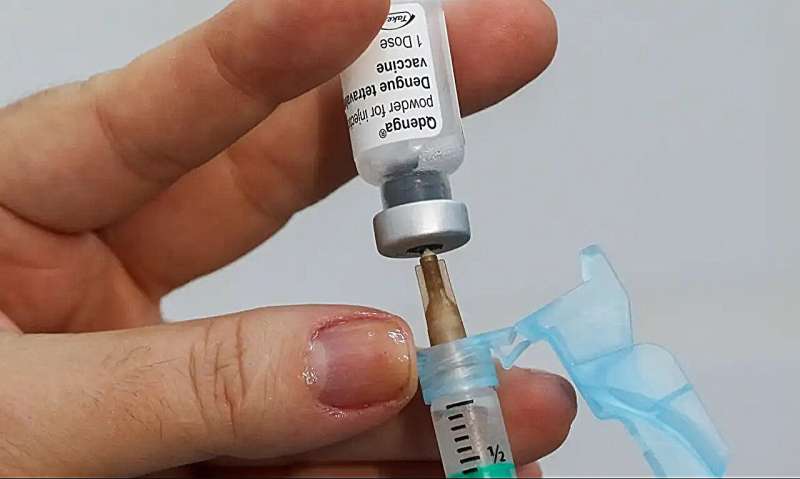This article has been reviewed according to Science X's editorial process and policies. Editors have highlighted the following attributes while ensuring the content's credibility:
fact-checked
trusted source
proofread
Study maps main genes involved in immune response to infection by dengue virus

By comparing data for the immune response to natural infection by dengue virus to data for activation of the immune system by dengue vaccines, researchers at the University of São Paulo (USP) have identified molecular markers that could be used in the development of novel vaccines and treatments for dengue.
They also reiterated the efficacy of two vaccines already available on the market: Q-Denga, manufactured by Takeda Pharma (Japan) and now being distributed by the national health service in Brazil (Sistema Único de Saúde, SUS), and Dengvaxia, produced by Sanofi-Pasteur (France). Both are live attenuated virus vaccines.
"We analyzed the data systemically and found various similarities between the immune response elicited by vaccines and the immune response to natural infection. Of course, vaccines induce an immune response without the damage done by the virus. We were also able to characterize several pathways [that involve signaling between defense cells]."
"The interferon pathway [mediated by this antiviral protein produced by leukocytes—white blood cells—and fibroblasts] proved to be crucial, with several important genes that can be considered novel biomarkers of the disease," Otávio Cabral-Marques, a professor of molecular medicine at the University of São Paulo's Medical School (FM-USP) and principal investigator for the study, told Agência FAPESP.
The study was reported in an article published in the journal Frontiers in Immunology. It is the first to identify immune signatures of dengue by systems vaccinology, an approach that explores the complex interactions underlying vaccine-induced immunity in humans.
The researchers analyzed 955 transcriptome samples from patients with natural dengue infection and participants in clinical trials of dengue vaccines (the transcriptome is the complete set of RNA molecules in the organism). They obtained the data from a public database.
They found 237 differentially expressed genes common to both the patient samples and trial participant samples.
"Based on 20 of these shared genes, we were able to create a panel to distinguish disease severity, especially in the late acute stage. We also used machine learning techniques to classify ten predictors [immune signatures] of disease severity in cases of natural infection. These are crucial to the immune response to the virus," said Desirée Rodrigues Plaça, first author of the article and a Ph.D. candidate at USP.
Dengue is caused by four viral serotypes (DENV-1 through DENV-4) and, when symptomatic, progresses through three clinical stages: febrile (initial acute), critical (late acute), and recovery.
Interferon pathway
"There are many differences, but we also found many similarities between the immune responses induced by vaccines and natural infection. By funneling the dataset, we identified 20 genes that are common to both processes and similarly expressed. They are responsible for enriching the immune system's protective pathways, especially the type I and type II interferon pathways," Plaça said.
Interferons are cytokines whose main role is to inhibit viral replication. They trigger a chain reaction that affects several molecules. According to the article, the interferon antiviral pathways are not only responsible for early (front-line) defense, but their complex biological functions also set the stage for the development of robust and lasting adaptive immunity.
"The interferon pathways are very important to activate the adaptive response, which consists of T cells and B cells [types of white blood cells called lymphocytes] and provides permanent protection [as do vaccines]. It's extremely important therefore to know which genes associated with the interferon pathways are key drivers of the adaptive response that affords the best protection," Placa said.
Genes
With the information they obtained in the study, the researchers were able to develop therapeutic strategies to inhibit, activate, or induce the expression of genes involved in the immune response, opening up possibilities for the investigation of targeted therapies for dengue fever.
They identified the main genes (such as OAS2, ISG15, AIM2, OAS1, SIGLEC1, IFI6, IFI44L, IFIH1 and IFI44) involved in orchestrating various aspects of the adaptive immune response. OAS2 and OAS1 have antiviral functions, while ISG15 restricts virus replication, for example.
AIM2 activates the inflammasome, a multiprotein complex of the innate immune system that, when activated, produces molecules that tell the system to send reinforcements to the infection site, initiating pro-inflammatory responses crucial for effective antiviral defense.
SIGLEC1 participates in immune cell interactions, facilitating antigen presentation and adaptive immune recognition. IFI6, IFI44L, and IFI44, all of which are interferon-inducible, are implicated in the modulation of apoptosis (programmed cell death) and antiviral defense. IFIH1 is a crucial sensor in shaping adaptive responses to RNA viruses such as dengue. IFIT5 and HERC5 "are known for their roles in interferon-mediated inhibition of viral replication", the authors note.
"The many relevant genes involved in this complex process underscore the intricacy of the link between the initial antiviral pathways and subsequent adaptive immune processes. It's as if the beginning and end of a story were joined up," Cabral-Marques said.
More information: Desirée Rodrigues Plaça et al, Immunological signatures unveiled by integrative systems vaccinology characterization of dengue vaccination trials and natural infection, Frontiers in Immunology (2024). DOI: 10.3389/fimmu.2024.1282754




















